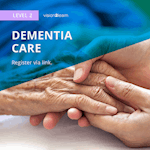Dementia Care Level 2
Online FREE course to help you learn key principles in supporting and caring for those with dementia
vision2learn
Summary
Fully funded by the Skills Funding Agency
- Exam(s) / assessment(s) is included in price
- Tutor is available to students
Overview
This Level 2 course provides learners with the key principles in supporting and caring for those with dementia, enabling them to actively assist individuals with the condition using appropriate methods.
- Learn about factors that contribute to effective dementia care
- Gain a practical insight into effective social and medical treatment
- Understand more about the benefits of a person-centred approach
- Discover how interaction and active engagement provides relief for individuals with dementia
Each unit contains an assessment to demonstrate your knowledge of each subject area. Once you successfully complete all units you will achieve a Level 2 Certificate in the Principles of Dementia Care.
Benefits of studying with vision2learn
- It’s FREE for eligible learners.
- Study 100% online at your own pace, whenever and wherever you like.
- Gain a vocational qualification valued by UK employers.
- One-to-one support from a dedicated tutor throughout your course.
- Free additional online and telephone customer support.
All courses are subject to availability, so apply today to secure your place.
Qualification
Level 2 Certificate in The Principles of Dementia Care
Course media
Description
Unit 1: Dementia awareness
Your learning goals:
- Defining dementia
- Key functions of the brain affected by dementia
- Why depression, delirium and age related memory impairment may be mistaken for dementia.
Unit 2: Person-centred approaches
Your learning goals:
- The medical model of dementia
- The social model of dementia
- Why dementia should be viewed as a disability.
Unit 3: Communication and interaction
Your learning goals:
- Factors influencing communication and interaction
- How a person-centred approach encourages positive communication
- Factors affecting interactions.
Unit 4: Equality, diversity and inclusion
Your learning goals:
- The importance of diversity of individuals with dementia
- Person-centred approaches in dementia care
- Ensuring diverse needs are met.
Unit 5: Administering medication
Your learning goals:
- Common medications
- Providing person-centred care through medication.
Unit 6: Understanding behaviour
Your learning goals:
- Behaviour as a means of communication
- Responding to behaviours associated with dementia
- Additional emotional support.
Unit 7: Engaging in activities
Your learning goals:
- Impact of activity on physical and mental well-being
- Social benefits of activities
- Activity as a basis for a model of care and support.
Who is this course for?
People looking to learn about factors that contribute to effective dementia care and gain a practical insight into effective social and medical treatment.
Requirements
To be eligible for a free place you must be:
- 19 or over at the start of the current academic year 31st August
- Resident of England only and does not cover Northern Ireland or Wales
- UK or EU resident of three years or longer or outside of the EU be able to provide Visa Evidence
- Your employment status or prior level of qualification may affect your eligibility to study with some colleges.
- You are able to complete the course regardless if you are working or receiving benefits. If you receive benefits, you will be asked to provide evidence in the form a current award letter.
Career path
This qualification can help with caring for those with dementia, enabling them to actively assist individuals with the condition using appropriate methods.
Reviews
Legal information
This course is advertised on reed.co.uk by the Course Provider, whose terms and conditions apply. Purchases are made directly from the Course Provider, and as such, content and materials are supplied by the Course Provider directly. Reed is acting as agent and not reseller in relation to this course. Reed's only responsibility is to facilitate your payment for the course. It is your responsibility to review and agree to the Course Provider's terms and conditions and satisfy yourself as to the suitability of the course you intend to purchase. Reed will not have any responsibility for the content of the course and/or associated materials.




